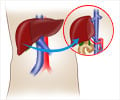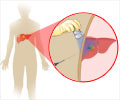A minimally invasive approach that avoids the large open incision to perform liver resection may soon be a viable alternative, revealed a new study.

‘The odds of serious morbidity, including major bleeding, serious infections, organ failure, and death, were significantly lower after major liver resection performed by minimally invasive surgery.’





The researchers evaluated 1,015 major liver resections
(hepatectomies) performed in 2014 at 65 hospitals that participate in
the American College of Surgeons National Surgical Quality Improvement
Program (ACS NSQIP®) Hepatopancreaticobiliary Collaborative. Of those
procedures, 13%, or 132, were performed using minimally invasive
surgery (MIS), the rest were performed using open operations. This
research is the largest multicenter study to date evaluating outcomes
after MIS major liver resection.
Lead investigator Lucas W. Thornblade, a general surgery resident at the University of Washington, Seattle, said, "Our study results showed that the odds of serious morbidity, including major bleeding, serious infections, organ failure, and death, were significantly lower after major liver resection performed by MIS."
In this study, the odds of death or serious complications in the short term for liver cancer patients who had MIS was about half that of those who had the conventional open procedure. Risk of bile leak, liver failure, a second operation, or readmission were similar between the two types of operations.
Dr. Thornblade and his coauthors undertook the study to evaluate the use of MIS in more challenging cases. "There has not been convincing evidence to support the routine use of MIS in these more challenging liver resections," Dr. Thornblade said. "But the ACS NSQIP registry recently began collecting data on hepatectomies. This new data presented a unique opportunity to look at a larger group of patients who are having these more challenging operations," he explained.
During MIS, the surgeon inserts instruments through small incisions, or ports, and with the guidance of a camera, controls the surgical instruments inside the abdominal cavity to perform the steps of surgery.
Advertisement
The location of the tumor and its relationship to major blood vessels are factors the surgeon takes into consideration when deciding if MIS is feasible. Hence, depending on the surgeon's experience and comfort level, MIS may only be an option when the tumor is accessible with the surgical instruments.
Advertisement
In 2015, an expert panel on minimally invasive surgery, the Second International Consensus Conference on Laparoscopic Liver Resection, issued a statement that MIS for major liver resection is still considered an innovative procedure. "Our study helps to contribute to that fund of knowledge," Dr. Thornblade said. "Our findings indicate that the odds of a favorable outcome for MIS major liver resection are significantly better, in selected cases, among surgeons who participate in NSQIP."
"However, more information is needed on long-term disease recurrence and survival after MIS liver procedures," Dr. Thornblade said. "There may come a time in the United States when we are interested in developing a trial to look at long-term outcomes with MIS liver resection."
Source-Eurekalert















